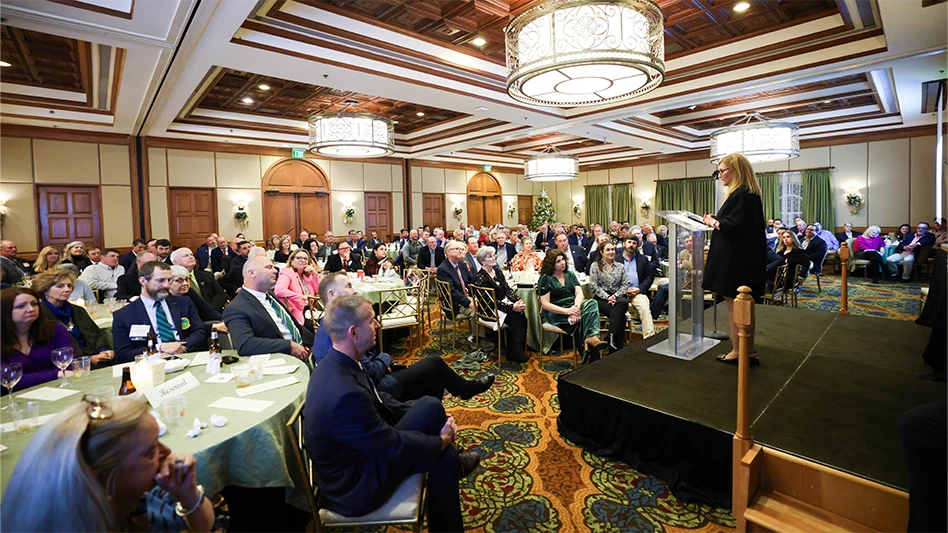Lucky 13
Things weren't looking great for the Meadow Springs Country Club in Jefferson, Wisc. in 2008. The city-owned course was being closed down because while they wanted to keep local golf alive, they couldn't justify spending money on the course. The course's fate seemed sealed when five holes were purchased for development and then abandoned, leaving the remaining 13 floating free and growing wild for a year.
 St. Coletta of Wisconsin, a program for those with developmental disabilities, acquired the course fragment with a non-profit organization, but couldn't do much with it. But Mike Kerig and a few other golf pros had the course's number.
St. Coletta of Wisconsin, a program for those with developmental disabilities, acquired the course fragment with a non-profit organization, but couldn't do much with it. But Mike Kerig and a few other golf pros had the course's number.
"They kind of got stuck with this property that was no longer being maintained as a golf course," says the superintendent now of the Jefferson Golf Club. "We went to them and said, 'If you want this open, we can get it there for you.'"
Working together, they started pulling the course back into shape in spring 2010, using a little trailer for a clubhouse while negotiations were going on with the old owners.
"We didn't really have our deal done until the middle of May," says Kerig. "We didn't have a building, no irrigation, didn't have any space for mowers or any mowers themselves. Once the deal was signed, we really got going."
Within a year of hard labor, the course came back strong, with bentgrass fairways growing in faster than Kerig anticipated. But working alongside Links Across America developed the idea of the short course as a viable way to keep golf in the community.
"The 13 holes is a novel idea," says Kerig. "The smaller golf course was right up their alley. People were kind of skeptical at first, but after they play it, they say, 'Hey, 13's a lot of fun!'"
Besides bringing in a shorter standard round of golf, the smaller course opens up a variety of routings for a nine-hole round. And any diehard who wants their 18 holes can reroute through a five-hole loop to complete it.
"It's a really nice routing because it doesn't take six hours," says Kerig. "We can get them in and out in four. It's certainly kept the price of golf down here, too. We can offer a four-hole rate, and the shorter time means parents can bring kids around to get them interested in the game."
The course is still young, but Kerig says it has a bright outlook because of the novelty of the short course and the guidance of Links Across America in getting things running again.
"Their organization is committed to keeping golf in communities," says Kerig. "I don't know if we could've kept going without them. But it proves you don't have to be a 18-hole, huge course. If you can get people out there, they'll have fun."
Facial hair for change
We clean up pretty nicely here at the GCI Intergalactic HQ – as long as you don't look at any of our desks. But we don't mind relaxing our rules a bit, especially if it's for a good cause. The GCI staff eschewed the razor to take part in Movember, the month-long movement to raise awareness for cancers affecting men by growing and grooming our facial hair.
 Though we didn't directly raise any money for research and support for the Prostate Cancer Foundation and Livestrong, we've been able to use our mo's to get guys talking about men's health issues that many of us generally wait to hear about from our doctors. Check out associate editor Kyle Brown's Movember page at http://mobro.co/kyleb.
Though we didn't directly raise any money for research and support for the Prostate Cancer Foundation and Livestrong, we've been able to use our mo's to get guys talking about men's health issues that many of us generally wait to hear about from our doctors. Check out associate editor Kyle Brown's Movember page at http://mobro.co/kyleb.
Some of our moustaches ended up being much grander than the others', however. Here's Kyle's before and after photos:
If you took part in Movember as well, e-mail us at gci@gie.net and show off your moustache!
Roll Call
Peter Dernoeden, Ph.D., turfgrass science professor at the University of Maryland, has been selected to receive the 2012 Golf Course Superintendents Association of America (GCSAA) Col. John Morley Distinguished Service Award.
Doug Lowe, Greensboro Country Club, Greensboro, N.C., is the new president of the Carolinas GCSA.
Mark Anzlovar was named the superintendent of Hollydot Golf Course at the Colorado City, Colo.
Syngenta named John Spaulding territory manager for the turf and landscape sales team.
Direct Solutions announced addition of Bryan Gooch as North American Marketing Manager with the Direct Solutions team.
Greenkeeper moves to a different beat
At 5 a.m., while most of us are still deep in slumber, Bill Gilkes has already been pounding the drums for half an hour.
"It's my getaway," says the seasoned superintendent of his daily morning ritual. What helps Gilkes keep such a positive outlook is that he always keeps things in perspective. The superintendent at Scarboro G&CC, the private club east of Toronto that celebrates its centennial this year, also owns a 1967 Mustang and loves tinkering with this antique car.
 Gilkes first started playing drums back in 1964 when his dad gave the then-9-year-old his first kit (Broadway). "My dad was a plumber," recalls the greenkeeper. "He was doing a job for Henry & Company, a pawn shop that later became Henry's Camera, and my dad made a deal with the owner to get a drum kit in exchange for his plumbing work."
Gilkes first started playing drums back in 1964 when his dad gave the then-9-year-old his first kit (Broadway). "My dad was a plumber," recalls the greenkeeper. "He was doing a job for Henry & Company, a pawn shop that later became Henry's Camera, and my dad made a deal with the owner to get a drum kit in exchange for his plumbing work."
At 12, Gilkes had another memorable musical moment. At the time, he was taking drum lessons at the house of jazz musician Lou Williamson. One Saturday morning, he arrived at his teacher's house to find Buddy Rich had stayed the night. Rich, who in his time played with many of the jazz greats, was nursing a hangover. As Gilkes recalls, the drummer came out of the bedroom in a bathrobe, with an ice pack on his head, hollering at his host for some aspirin.
"He then walked over to me, took one of my drumsticks in his left hand and told me I needed to do more with my left hand," laughs Gilkes. "Then he did a roll on my kit … it was unbelievable."
Gilkes went to his first rock concert at 11; the show was Jimi Hendrix at The Coliseum at the Canadian National Exhibition and his older sister was his chaperone. Memories of this first brush with rock 'n roll greatness are ever-present as the wall behind his Ludwig John Bonham classic drum kit — his instrument of choice these days — is adorned with a Hendrix banner. And the 11,104 songs that fill his iPod are an eclectic mix: everything from The Carpenters to Hendrix.
Flash back to 1970 and Gilkes drummed in a band called Fat Moon. He says they played all over Toronto and developed into one of those 'what if' stories.
"We were a bit ahead of our time," he explains. "We were writing our own material at a time when all people wanted to hear local bands play was covers. We rehearsed in a space near the former National Hotel in downtown Toronto and two floors down rehearsed Rush, who at the time was a Led Zeppelin tribute band."
You never know, rather than cutting grass for a leaving, Gilkes could have been travelling the world as a rock 'n roller. Then again, the 56-year-old says he wouldn't change a thing. He still enjoys drumming as a hobby and besides banging the skins in his basement office at Scarboro every morning, he also plays once in a while at the open jam sessions in downtown Toronto. Gilkes loves his job as a superintendent at the only remaining A.J. Tillinghast course in Canada.
"I went from making $23/hour to $8.50 per hour, but it was the best decision I ever made," he says. "I've loved every day I've been in the business. I have a lot of freedom and I am surrounded by great people. If I want, my office can be any hole on the golf course. It's something I wish I could bottle up and sell."

Explore the December 2011 Issue
Check out more from this issue and find your next story to read.
Latest from Golf Course Industry
- Golf Construction Conversations: Reed Anderson
- ’Twas the Night Before Christmas (on turf)
- Twas the Night Before Christmas (the turf version audio)
- Advanced Turf Solutions and The Aquatrols Company release soil surfactant
- Heritage Golf Group acquires North Carolina courses
- Editor’s notebook: Green Start Academy 2024
- USGA focuses on inclusion, sustainability in 2024
- Greens with Envy 65: Carolina on our mind





